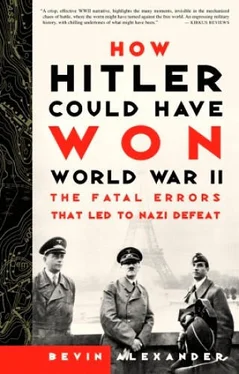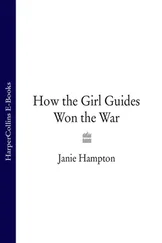The doctor placed himself between Patton and the patient, and Patton departed. The medical authorities sent a report to Omar Bradley, commander of 2nd Corps in Patton’s army. Bradley locked the paper in his safe and said nothing. The doctors, however, also forwarded their report to Eisenhower. He sent Patton a letter that questioned his judgment and self-discipline, ordered him to explain his actions, and told him to apologize to those who witnessed the events.
When some newspaper correspondents got wind of the incident, Eisenhower asked them to withhold publication because it would require him to fire Patton. The journalists agreed. Meanwhile Patton wrote a humble letter to Eisenhower; summoned doctors, nurses, and medical personnel of the two hospitals to Palermo and expressed his regret; and called the two soldiers into his office, apologized, and shook hands.
Eisenhower hoped the matter had ended. In November, however, Drew Pearson, an American newspaper columnist, revealed the slapping incidents on a national radio broadcast. In the public furor that followed, many citizens demanded Patton’s dismissal. The storm slowly subsided. But when Eisenhower named the army group commander to direct American ground troops going into Normandy, he selected Bradley. Patton stayed for months in Sicily without a job, but on January 22, 1944, Eisenhower ordered him to Britain to take command of the U.S. 3rd Army—and delivered him from disgrace.
19 THE CITADEL DISASTER

THE CAMPAIGNS OF 1941 AND 1942 HAD PROVED THAT GERMAN PANZERS WERE virtually invincible when they maneuvered freely across the great open spaces of Russia and Ukraine. The proper decision for Germany in 1943, therefore, was to make strategic withdrawals to create fluid conditions so panzers could carry out wide movements and surprise attacks. This would have given maximum effect to the still superior quality of German command staffs and fighting troops.
Instead, as General Friedrich-Wilhelm von Mellenthin, one of the most experienced panzer leaders on the eastern front, wrote, “The German supreme command could think of nothing better than to fling our magnificent panzer divisions against Kursk, which had now become the strongest fortress in the world.”
Head-to-head confrontation was becoming increasingly unrealistic as the disparity of strength between Germany and the Allies grew. By mid-1943, even after urgent recruiting of non-Germans, Hitler’s field forces amounted to 4.4 million men. The Red Army alone had 6.1 million, while Britain and the United States were mobilizing millions more. In war production the Allies were far outproducing Germany in every weapon and every vital commodity.
Erich von Manstein offered Hitler the best strategic plan still open to him shortly after the recapture of Kharkov in late winter. The German front projected dangerously as a “balcony” southeastward from Kharkov more than two hundred miles down the Donetz and Mius rivers to Taganrog, on the Sea of Azov. The 17th Army also was still in the Kuban peninsula of the Caucasus.
“The bulge in the German front,” Manstein wrote, “was just begging to be sliced off.”
The Russians might break through east of Kharkov and drive southwest to the Black Sea coast in hopes of cutting off and destroying the entire German southern wing. This was the movement Manstein had feared after the fall of Stalingrad, and it remained an ever-present danger.
But the balcony offered a wonderful bait as well. Manstein had proposed the plan after Stalingrad, and he now urged it on Hitler again. As soon as the Russians launched an attack southward, he said, all German forces on the Donetz and Mius should withdraw step by step, pulling the Red Army westward toward the lower Dnieper River around Dnepropetrovsk and Zaporozhye. At the same time, reserves should assemble west of Kharkov, and drive into the northern flank of the Russians as they advanced westward.
“In this way,” Manstein asserted, “the enemy would be doomed to suffer the same fate on the coast of the Sea of Azov as he had on store for us on the Black Sea.”
Hitler did not understand mobile warfare, or surrendering ground temporarily to give his forces operational freedom. He rejected Manstein’s plan. He turned to the kind of brute force, frontal battle he did understand. Hitler resolved to attack the Kursk salient—a 150-mile-wide bulge that extended nearly a hundred miles into the German front north of Belgorod and Kharkov and south of Orel.
The idea for this attack (Operation Citadel) originated with Kurt Zeitzler, army chief of staff, and Günther von Kluge, commander of Army Group Center. They proposed to cut off the salient at its eastern base and destroy the Russian forces within it.
Manstein’s Army Group South was to drive north with eleven “fast divisions” (panzer or panzergrenadier) and five infantry divisions, while Kluge’s army group was to push south with six fast and five infantry divisions. Because of technical problems in getting new Tiger and Panther tanks into combat condition, Hitler advanced the date of Citadel to July 5, giving the Russians all the time they needed to prepare.
The Russians picked up evidence of the Kursk buildup from radio intercepts and a spy ring in Switzerland. They began to assemble overwhelming strength in and around the salient.

The only forceful opponent of the attack now became Heinz Guderian, whom Hitler had brought back in February 1943 as inspector of armored troops. At a conference on May 3–4, 1943, at Munich with Hitler and other generals, Guderian looked at aerial photographs showing the Russians were preparing deep defensive positions—artillery, antitank guns, minefields—exactly where the German attacks were to go in.
Guderian said Germany ought to be devoting its tank production to counter the forthcoming Allied landings in the west, not wasting it in a frontal attack against a primed and waiting enemy.
A few days later in Berlin, Guderian told Hitler: “It’s a matter of profound indifference to the world whether we hold Kursk or not.” Hitler replied: “You’re quite right. Whenever I think of this attack my stomach turns over.”
Meanwhile Guderian was having great problems with the new Panther tank, armed like the Tiger with a powerful 88-millimeter gun. Its track suspension and drive were not operating correctly, and optical instruments were unsatisfactory. He told Hitler on June 15 that the Panthers were not ready for battle, but by now Hitler had committed himself and turned a deaf ear.
In the Kursk salient the Russians barred likely avenues of approach with minefields and tank traps, built several lines of resistance, and converted important points into defensive bastions. Even if the Germans hacked their way through the minefields and broke the barriers, the Russians would have time to withdraw, and the Germans would gain little.
Hitler was committing the same error he had made at Stalingrad: he was going to attack a fortress, throwing away all the advantages of mobile tactics and meeting the Russians on ground of their own choosing. Besides that, he was concentrating his strength along a narrow front and gravely weakening the rest of the line, as he also had done at Stalingrad.
The Germans assembled 900,000 men, 10,000 cannons, 2,000 aircraft, and 2,000 tanks. The Russians marshaled 1.9 million men, 20,800 cannons, 2,000 aircraft, and 5,100 tanks.
Except for parity in aircraft, Hitler was risking his entire position in the east by attacking an enemy with more than twice his own strength. Even more ominous, the Russians had not stripped their other fronts to achieve this huge mass of men and weapons. They were assembling strong forces on either flank of Kursk, with the intention of breaking through and rolling up the German army, just as they had done on either side of Stalingrad.
Читать дальше




![Джонатан Димблби - Barbarossa - How Hitler Lost the War [calibre]](/books/385421/dzhonatan-dimblbi-barbarossa-how-hitler-lost-the-w-thumb.webp)









